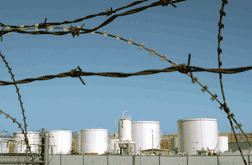FOR IMMEDIATE RELEASE
January 17, 2002
Sandia studies security at nation’s chemical plants
|

Sandia National Laboratories security experts were developing a security assessment methodology for the nation’s chemical plants, refineries, and chemical storage areas long before Sept. 11. The methodology is being submitted to Congress.
(Photo by Randy Montoya)
Download 300dpi JPEG image, ‘tankfarm2.jpg’, 1.1MB (Media are welcome to download/publish this image with related news stories.)
|
ALBUQUERQUE, N.M. — Security experts at Sandia National Laboratories are helping shore up anti-terrorism defenses at the nation’s chemical plants.
As part of a project sponsored by the Department of Justice (DOJ), Sandia physical security experts have developed a systematic, risk-based assessment process called a vulnerability assessment methodology (VAM) that could be used to evaluate and improve security at more than 10,000 facilities in the U.S. that manufacture, store, or use hazardous chemicals.
The Sandia researchers have visited several facilities, reviewed current security practices, and developed a methodology that can be used to assess the adequacy of efforts at U.S. chemical plants to prevent terrorist attacks or blunt their effects.
A draft report has been submitted to the DOJ for review, and the Attorney General’s office will prepare and submit the final report to Congress.
Sandia experts previously have helped U.S. government and industry assess the security of government buildings, dams, drinking water supplies, and other possible terrorist targets using some of the same systematic risk-assessment tools that protect U.S. nuclear weapons facilities. Sandia is a U.S. Department of Energy laboratory.
The chemical plant project began in January 2001. But the terrorist attacks on Sept. 11 increased awareness of vulnerabilities not only of the physical security of the plants themselves but also of the transport of chemicals and of the cyber systems that control the plants, says Sandia project leader Cal Jaeger.
Since January 2001 Sandia experts have visited several U.S. chemical plants, discussing each plant’s operations with security officials and touring the sites with a terrorist’s eye. They review security plans, study plant layouts and access controls, evaluate the use of security technologies, gauge safety and other mitigation measures, and test and refine the methodology.
“We ask, if I am a bad guy, what could I do,” says Jaeger. “Then we evaluate the effectiveness of current protection measures and the likelihood and consequences of each threat scenario.”
The visits, along with the expertise of the chemical industry, have helped shape the prototype VAM. The long-term goal is to create a methodology that, after some training, can be used by plant owners and security managers to assess the risk at their facilities for a wide range of threats, says Jaeger.
“The VAM prototype helps you identify critical areas and provides a means to not only assess the risk of an adversary attack but also helps in selecting the most cost-effective upgrade options for those areas where the risk is unacceptable,” says Jaeger.
Sandia is a multiprogram laboratory operated by Sandia Corporation, a Lockheed Martin Company, for the United States Department of Energy under contract DE-AC04-94AL85000. With main facilities in Albuquerque, N.M., and Livermore, Calif., Sandia has major research and development responsibilities in national security, energy and environmental technologies, and economic competitiveness.
Media contact:
John German, jdgerma@sandia.gov, (505) 844-5199
Related Sandia projects:
|
